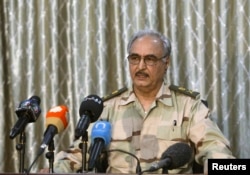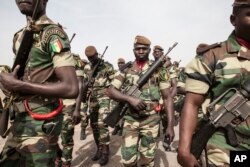The commander of the United States Africa Command — which oversees military operations across Africa — has told VOA that the only way to peace in Libya is by bringing together rival governments. General Thomas Waldhauser made the remarks at the recent Munich Security Conference, ahead of Operation Flintlock, a joint military exercise being hosted by seven African nations.
Libya’s political chaos remains entrenched. The internationally-backed Government of National Accord controls only part of Tripoli, while rival power bases vie for the capital and other cities. In the east, General Khalifa Haftar — head of the Libyan National Army — holds sway over the House of Representatives.
Speaking to VOA at the Munich Security Conference Sunday, General Thomas Waldhauser — commander of the United States Africa Command — said the U.S. is pushing for a unity deal.
“There’s no doubt about the fact that Haftar and his influence, especially in the east, is something that has to be dealt with. And this is where we talk about a political solution that has to take place, this is where it all begins,” he said.
Haftar’s forces control most of Libya’s oil fields. Russian state-owned oil giant Rosneft signed a preliminary agreement with Libya’s National Oil Company Tuesday to invest billions of dollars, the latest move by Moscow to reassert ties with Libya — and further evidence of its strong backing for Haftar. General Waldhauser acknowledged that Russia would likely play a role in any solution.
“We welcome anyone’s… the goal is to get those two together. The goal is to get those two to talk, and the goal is to make some accommodation in that regard.”
The U.S. has conducted a sustained air campaign against Islamic State militants in Libya — and in January dispatched B-2 bombers on a 9,400-kilometer journey from a Missouri airbase to target training camps.
The U.S. military’s Africa Command is building partnerships in the Sahel region aimed at tackling terrorists — staging an annual joint exercise known as Operation Flintlock.
Nigeria is a key regional partner, and the U.S. is providing intelligence support in the country’s fight against Islamic State-affiliated terror group Boko Haram. At the Munich Security Conference, Nigerian Major General Babagana Monguno said the association of global terror groups means international cooperation is vital.
“The uprising in Libya and the eventual capitulation of the Gadhafi government resulted in a southward flow of arms and human beings. The most natural place in sub-Saharan Africa for this flow was Nigeria,” he said.
Nigerian soldiers have been accused of abuses by human rights group Amnesty International in their fight against Boko Haram. General Waldhauser said the U.S. military takes such allegations seriously when working with partners.
“We understand the requirement for battlefield ethics. We make it part of our training, and we try to continue to emphasize that more than just those aspects but also in the legal system, and in our discussions with key leaders as well,” he said.
Operation Flintlock 2017 is about to get under way. The three-week exercise will bring together 2,000 service personnel from more than 20 African, European and North American partner nations.







